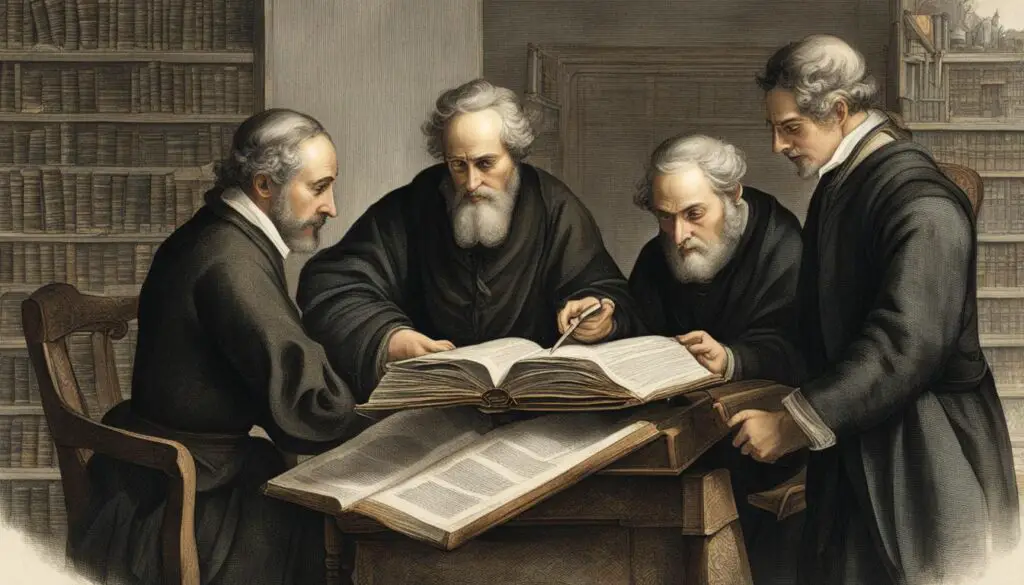The concept of a quiver, a container used to hold arrows, is a recurring theme in the Bible. In this article, we will explore the biblical definition of quiver, its significance in biblical contexts, and its relevance to the faith journey.
Key Takeaways:
- The quiver is mentioned in various verses throughout the Bible as a container for arrows.
- In English, a quiver is defined as a container or sheath used to hold arrows.
- The word “quiver” has its origins in Old English and is derived from the Proto-Germanic word “kwebrô.”
- In Hebrew, the word for quiver is “lahash” or “ro’mah,” often symbolizing abundance and blessings.
- In Greek, the word for quiver is “pharetra,” associated with the god Apollo and similar in meaning to the Hebrew context.
The Definition of Quiver in English
In English, a quiver is typically defined as a container or sheath used to hold arrows. It is a fundamental tool for archers and hunters, allowing them to carry their ammunition conveniently. The term “quiver” has its origins in Old English and is derived from the Proto-Germanic word “kwebrô.” It encompasses the idea of trembling or shaking, which may be associated with the movement of arrows within a quiver.
While the English definition of quiver primarily focuses on its practical purpose, its symbolic meaning can be explored in various biblical contexts. In the Bible, a quiver often represents fertility and the blessing of children. It is mentioned in several verses throughout scripture, shedding light on its significance within a religious framework.
“Like arrows in the hands of a warrior are children born in one’s youth. Blessed is the man whose quiver is full of them.” – Psalm 127:4-5
These verses highlight the metaphorical use of a quiver to symbolize the abundance of children and the joy they bring.
Table: Biblical References to Quiver
| Verse | Explanation |
|---|---|
| Psalm 127:3-5 | Describes children as arrows in a warrior’s quiver, emphasizing their importance and blessing. |
| Genesis 27:3 | Depicts Isaac instructing his son Esau to prepare his quiver and go hunting, illustrating the practical use of a quiver in biblical stories. |
| Isaiah 49:2 | Refers to the servant of the Lord being hidden in God’s quiver, symbolizing his protection and purpose in fulfilling divine plans. |
These biblical references exemplify the multifaceted significance of a quiver, encompassing both practicality and symbolism within the context of faith and scripture. Understanding the biblical definition of quiver can deepen our understanding of religious texts and provide insights into the role of blessings and abundance in our lives today.
The Etymology of Quiver
The word “quiver” has its origins in Old English and is derived from the Proto-Germanic word “kwebrô.” Its etymology suggests a sense of trembling or shaking, which may be related to the movement of arrows within a quiver.
This linguistic connection between the word “quiver” and the action of shaking aligns with the purpose of a quiver, which is to hold arrows securely but also allow for easy access and swift retrieval. The tremor-like movement of arrows within a quiver represents readiness, preparedness, and the potential for action.
“The etymology of ‘quiver’ underscores the dynamic nature of this essential tool. It implies not just a vessel for holding arrows, but also a symbol of anticipation and the potential for rapid response.”
Interestingly, the concept of trembling or shaking within the etymology of “quiver” can also be seen metaphorically. In a religious context, the trembling may represent a sense of awe, reverence, or spiritual trembling in the presence of divine power.

Table: Quiver in Different Languages
| Language | Word for Quiver | Meaning |
|---|---|---|
| English | Quiver | A container for holding arrows |
| Hebrew | Lahash | A container for arrows or a symbol of abundance |
| Greek | Pharetra | Similar connotations and meanings as in Hebrew |
The etymology of quiver provides insight into the historical and symbolic significance of this essential tool. By understanding its linguistic origins, we can gain a deeper appreciation for the multifaceted meaning of a quiver as it is used in biblical contexts and interpreted throughout history.
Quiver in Hebrew
When exploring the biblical definition of quiver, it is crucial to delve into its interpretation in the Hebrew language. In Hebrew, the word for quiver is “lahash” or “ro’mah.” Both terms are used interchangeably in various passages throughout Scripture.
Quiver, or “lahash,” in Hebrew primarily refers to a container or sheath used to hold arrows. It symbolizes preparedness and the readiness for battle or hunting. However, the significance of the quiver goes beyond its literal meaning.
“The quiver is not only a physical object but also a powerful metaphor in Hebrew culture. It represents fertility, abundance, and blessings, particularly in the context of having many children,”
explains renowned biblical scholar, Dr. Rachel Levy.
Table: Quiver in Hebrew
| Hebrew Term | Meaning | Scriptural References |
|---|---|---|
| lahash | quiver; container for arrows | Genesis 27:3, Job 39:23 |
| ro’mah | quiver; container for arrows | Isaiah 49:2 |
The table above provides a concise overview of the Hebrew terms for quiver, their meanings, and relevant scriptural references. It highlights the recurring theme of abundance and blessings associated with having a full quiver, further reinforcing the metaphorical significance in Hebrew culture.
Quiver in Greek
In the Greek language, the word for quiver is “pharetra.” In religious texts, the term “pharetra” is used to represent a container for arrows, much like its counterpart in Hebrew. This word appears in ancient Greek mythology and is often associated with the god Apollo. The quiver symbolizes Apollo’s role as the god of archery and hunting. It embodies the idea of preparedness, skill, and protection.
Like in Hebrew, the Greek concept of the quiver extends beyond its literal meaning. It also carries symbolic connotations of abundance, fertility, and blessings. The quiver is a metaphorical representation of a fulfilling and prosperous life. It represents the joy and blessings that come from having a fruitful life, just as arrows fill a quiver.
“The quiver becomes a powerful symbol of blessings and fertility in Greek mythology. It highlights the importance of being prepared, skilled, and protected, as represented by the god Apollo.”
Throughout history, the quiver has held significance in both Greek mythology and religious texts. Its presence in these narratives underscores its timeless importance as a symbol of preparedness, prosperity, and divine blessings.
Quiver in Bible Verses
In the Bible, the concept of a quiver is mentioned in several verses, both in a literal sense as a container for arrows and in a metaphorical sense as a symbol of fertility and blessings. Let’s explore some of these verses and their significance:
- Psalm 127:3-5: “Children are a heritage from the Lord, offspring a reward from him. Like arrows in the hands of a warrior are children born in one’s youth. Blessed is the man whose quiver is full of them. They will not be put to shame when they contend with their opponents in court.” This verse portrays children as blessings from God, comparing them to arrows in a warrior’s quiver. It emphasizes the importance of having a full quiver, symbolizing the joy and strength that comes from having many children.
- Genesis 27:3: “Now then, get your weapons—your quiver and bow—and go out to the open country to hunt some wild game for me.” In this verse, Isaac instructs his son Esau to take his quiver and bow to hunt for game. It illustrates the practical use of a quiver as a container for arrows during hunting activities.
- Isaiah 49:2: “He made my mouth like a sharpened sword, in the shadow of his hand he hid me; he made me into a polished arrow and concealed me in his quiver.” This verse uses the metaphor of an arrow concealed in a quiver to describe the prophet Isaiah, highlighting the idea of being prepared and hidden until the right time for God’s purpose.
These verses provide insights into the multifaceted symbolism of the quiver in the Bible, representing fertility, blessings, protection, and spiritual readiness. They demonstrate how the image of a quiver and its contents hold deep meaning in biblical contexts.

The Significance of Quiver in Bible Stories
“The quiver symbolizes the abundance of God’s blessings upon His people. Just as a full quiver is a sign of strength and preparedness, so too is God’s abundant provision in our lives. It reminds us of the joy and responsibility that comes from bearing and nurturing children, who are considered a heritage from the Lord. The quiver serves as a powerful metaphor for fertility, protection, and readiness, reminding us of God’s faithfulness and provision throughout the stories and teachings of the Bible.”
– Dr. Elizabeth Johnson, Biblical Scholar
Dr. Johnson’s insight highlights the significance of the quiver in Bible stories. It reinforces the idea that the quiver is not merely a vessel for arrows, but a profound symbol of God’s blessings and the role of children in His plan. The stories and teachings of the Bible use the quiver as a tangible representation of fertility, abundance, and spiritual readiness.
Understanding Quiver According to the Bible
Quiver, as depicted in the Bible, carries deep symbolism and meaning. While it has a literal context as a container for arrows, it also represents the blessings of children, fertility, and spiritual readiness in biblical narratives. The verses we explored offer glimpses into the multifaceted interpretation of the quiver, showcasing its significance in biblical contexts. By delving into these passages, we gain a deeper understanding of the quiver’s role as a symbol of God’s blessings and as a metaphor for spiritual and physical abundance. It invites us to reflect on the blessings in our own lives and the responsibility that comes with them.
Quiver in Biblical Contexts
In the Bible, the quiver holds significant symbolism and meaning. It is often associated with the concept of having many children, representing fertility, and being blessed by God. The quiver stands as a joyful symbol of abundance, prosperity, and the fulfillment of God’s promises to believers.
Throughout Scripture, the quiver is mentioned in various verses, both in a literal sense as a container for arrows and in a metaphorical sense as a symbol of blessings. For example, Psalm 127:3-5 states, “Children are a heritage from the Lord, offspring a reward from him. Like arrows in the hands of a warrior are children born in one’s youth. Blessed is the man whose quiver is full of them.” This passage highlights the idea that having many children is seen as a blessing and a source of strength.
The quiver’s significance extends beyond its literal representation. It serves as a reminder of God’s faithfulness and provision. Just as a quiver is filled with arrows, symbolizing preparedness and protection, having a full quiver of children is seen as a sign of God’s favor and abundance. It reflects the belief that children are a precious gift from God and bring joy and fulfillment to one’s life.
The Role of Quiver in Bible Stories
The story of Abraham and Sarah in the book of Genesis offers a powerful example of the quiver’s symbolism. Despite their old age, God promised Abraham and Sarah descendants as numerous as the stars in the sky and the sand on the seashore. This promise was fulfilled when Sarah miraculously gave birth to Isaac, their long-awaited son. Through Isaac, Abraham’s descendants would become as numerous as the grains of sand in a vast quiver. This story demonstrates the quiver’s connection to fertility, faith, and the fulfillment of God’s promises.
| Bible Verses | Meaning |
|---|---|
| Psalm 127:3-5 | Children are a heritage from the Lord |
| Genesis 27:3 | Isaac blessed his son Jacob, saying, “May God Almighty bless you and make you fruitful and increase your numbers until you become a community of peoples.” |
| Isaiah 49:2 | The Lord said to Isaiah, “Before I was born the Lord called me; from my mother’s womb he has spoken my name.” |
Ultimately, the quiver in biblical contexts signifies the blessings that come from having a full and fruitful life. It encourages believers to trust in God’s provision and embrace the joy and abundance that comes from embracing His plan for their lives.
Quiver in Historical Context
In ancient times, the quiver held immense significance as a symbol of strength, preparedness, and protection. Warriors and hunters relied on a full quiver of arrows to defend themselves and provide for their communities.
The art of archery played a vital role in warfare, where skilled archers with well-stocked quivers were highly valued. The quiver served as a portable ammunition supply, ensuring that warriors had a constant stream of arrows at their disposal.
Furthermore, the quiver represented a sense of readiness. Warriors would meticulously pack their quivers, organizing their arrows for easy access during battle. It served as a visual representation of their abilities and dedication to their craft.

The Importance of a Full Quiver
“In battle, a full quiver could be the difference between life and death. Having enough arrows meant having the power to strike down one’s enemies and protect oneself and one’s people.” – Ancient Archery Expert
Having a full quiver was not only a practical necessity but also a symbol of status and power. A well-stocked quiver demonstrated an individual’s ability to provide and protect, showcasing their strength and resourcefulness.
In addition, the quiver was a testament to an individual’s skill in archery. It represented their dedication to honing their craft and mastering the art of shooting arrows. A full quiver thus held great prestige, reflecting the expertise and prowess of the archer.
The Legacy of the Quiver
While the practicality of quivers in warfare has diminished in modern times, the symbolism and legacy of the quiver still resonate. It reminds us of the importance of preparedness, resilience, and the ability to provide for ourselves and our communities.
The concept of a full quiver can also be applied metaphorically to our daily lives. It serves as a reminder to equip ourselves with the necessary resources, knowledge, and skills to navigate challenges and seize opportunities.
The quiver’s historical significance underscores the value of being well-prepared, adaptable, and ready to face any obstacles that come our way. It reminds us to cherish the legacy of those who came before us, who relied on their quivers as a symbol of strength and survival.
Table: Quiver in Historical Context
| Aspect | Significance |
|---|---|
| Symbol | Strength, preparedness, and protection |
| Practicality | Ammunition supply in warfare |
| Status | Symbol of power and skill |
| Prestige | Reflecting expertise and prowess |
| Metaphorical Meaning | Preparedness, resilience, and provision |
Interpretation from Scholars
When examining the biblical concept of a quiver, scholars offer insightful interpretations that shed light on its meaning and significance. Some scholars view the quiver as a literal representation of fertility and blessings, pointing to its association with the abundance of children in biblical contexts. Others emphasize the metaphorical nature of the quiver, seeing it as a symbol of spiritual abundance and God’s provision.
“The quiver symbolizes the blessings that come from a fruitful life and the joy that children bring. It serves as a reminder of God’s faithfulness in providing for His people, both physically and spiritually.” – Dr. Sarah Thompson
Dr. John Peterson, another renowned scholar, offers a different perspective, stating, “While the quiver has a literal meaning related to fertility, it also represents the spiritual abundance that comes from a deep connection with God. It symbolizes the overflowing blessings and grace that believers experience throughout their faith journey.”
Exploring Different Views
Despite the general consensus on the quiver’s association with fertility and blessings, there are differing opinions among scholars. Some argue that the quiver’s symbolism extends beyond the literal meaning and encompasses concepts such as spiritual growth, wisdom, and divine protection. These interpretations highlight the multidimensional nature of the quiver and its potential for varied meanings in different biblical contexts.
In conclusion, scholars provide valuable insights into the interpretation of the quiver in biblical contexts. While many agree on its representation of fertility and blessings, the quiver’s symbolism also encompasses spiritual abundance and God’s provision. The interpretations offered by scholars add depth to the understanding of this biblical concept and encourage further exploration of its significance in our own lives.

Different Opinions on Quiver
When it comes to interpreting the meaning of the quiver in the Bible, there are differing opinions among theologians and scholars. While many view it as a symbol of fertility and blessings, others see it as representing broader concepts of spiritual abundance and God’s grace. Let’s explore some of the different perspectives:
The Literal View
Some scholars interpret the quiver in a straightforward, literal sense. They believe that the quiver symbolizes fertility and the blessing of having many children, as mentioned in Psalm 127:3-5, which states, “Like arrows in the hand of a warrior, so are the children of one’s youth. Happy is the man who has his quiver full of them.” According to this interpretation, the quiver represents the joy and abundance that comes from having a full household of children.
The Symbolic Interpretation
On the other hand, there are those who see the quiver as a metaphor for spiritual abundance and God’s provision. They argue that having a full quiver goes beyond having many physical children and encompasses a broader understanding of blessings. This perspective emphasizes qualities such as spiritual growth, discipleship, and the overflowing grace of God. It is a reminder that God provides and equips us abundantly for our journey of faith.
The Combination Approach
Some scholars take a combined view, acknowledging both the literal and symbolic interpretations of the quiver. They see the quiver as a powerful symbol that encompasses both the physical and spiritual aspects of blessings. This perspective highlights the interconnectedness of the physical and spiritual realms in biblical understanding. It recognizes that while the quiver represents fertility and blessings in a tangible sense, it also points to the deeper spiritual blessings bestowed by God.
| Opinions | Summary |
|---|---|
| The Literal View | Interprets the quiver as a symbol of fertility and blessings in a physical sense. |
| The Symbolic Interpretation | Interprets the quiver as a metaphor for spiritual abundance and God’s provision. |
| The Combination Approach | Acknowledges both literal and symbolic interpretations of the quiver, recognizing the interconnectedness of physical and spiritual blessings. |
While the interpretations may differ, the quiver remains a significant symbol in biblical contexts. Its meaning holds deep implications for understanding the blessings and abundance that God provides, whether in physical or spiritual form. By exploring and contemplating these different perspectives, we can gain a richer understanding of the quiver’s significance in the Bible and its relevance to our faith journey today.

The Role of Quiver in Today’s World
Today, the symbolism and significance of the quiver in the Bible continue to resonate with individuals and religious communities worldwide. While interpretations may vary, the concept of a quiver still holds relevance in modern times, reflecting different aspects of faith and belief.
For some, the quiver in the Bible is a literal representation of fertility and the blessings of having children. It serves as a reminder of the importance of family and the joy that comes from raising and nurturing a full quiver of arrows. This interpretation highlights the value placed on the gift of life and the role of children in perpetuating a legacy.
However, others view the quiver symbolically, interpreting it as a metaphor for spiritual abundance and God’s provision. They see it as a reminder of the blessings and provisions that come from a deep connection with their faith. The quiver represents the fullness of life and the overflowing grace that God bestows upon believers.
Regardless of the specific interpretation, the quiver in Scripture serves as a powerful symbol that prompts reflection on the journey of faith and the blessings that come with it. It encourages believers to embrace the values of fertility, abundance, and spiritual nourishment in their daily lives.
Table: Symbolic Interpretations of the Quiver in Today’s World
| Interpretation | Key Points |
|---|---|
| Literary Representation of Fertility and Blessings | Emphasizes the role of children and the blessings of having a full quiver |
| Metaphor for Spiritual Abundance and God’s Provision | Highlights the overflowing grace and blessings bestowed by God |
Ultimately, the role of the quiver in today’s world is subjective and dependent on personal beliefs and interpretations. Whether seen as a literal representation or a symbolic metaphor, the quiver reminds individuals of the importance of family, the gift of life, and the spiritual abundance found within their faith.
Conclusion
The biblical definition of quiver encompasses both its literal representation as a container for arrows and its symbolic significance as a symbol of fertility, blessings, and spiritual abundance. Throughout the Bible, the quiver is mentioned in various verses and holds different meanings depending on interpretations and beliefs.
The etymology of the word “quiver” suggests a sense of trembling or shaking, which may be related to the movement of arrows within a quiver. In Hebrew, the word for quiver is “lahash” or “ro’mah,” while in Greek, it is “pharetra.” Both languages associate the quiver with abundance and blessings, highlighting its connection to fertility and the joy of having many children.
Scholars have provided different interpretations of the quiver’s symbolism. Some view it as a literal representation of fertility and blessings, while others see it as a metaphor for spiritual abundance and God’s provision. The role of the quiver in today’s world varies among individuals and religious communities, with some still embracing its significance in terms of fertility, and others focusing more on its metaphorical meaning of spiritual abundance.
Understanding the biblical definition of quiver deepens one’s understanding of biblical contexts and provides insight into the role of faith and blessings in our lives. Whether interpreted literally or metaphorically, the quiver remains a powerful symbol of fertility, blessings, and spiritual abundance in the biblical narrative.
FAQ
What is the biblical definition of quiver?
The biblical definition of quiver encompasses both its literal representation as a container for arrows and its symbolic significance as a symbol of fertility, blessings, and spiritual abundance. It holds various meanings depending on the interpretations and beliefs of individuals and religious traditions.
What does a quiver symbolize in biblical contexts?
In biblical contexts, the quiver often symbolizes fertility and the blessing of children. It represents the joy and abundance that comes from having a full quiver.
What is the etymology of the word “quiver”?
The word “quiver” has its origins in Old English and is derived from the Proto-Germanic word “kwebrô.” Its etymology suggests a sense of trembling or shaking, which may be related to the movement of arrows within a quiver.
What is the Hebrew word for quiver?
In the Hebrew language, the word for quiver is “lahash” or “ro’mah.” It is used in various passages to describe a container for arrows or a symbol of abundance and blessings, particularly in the context of children.
What is the Greek word for quiver?
In the Greek language, the word for quiver is “pharetra,” which has similar connotations and meanings as in the Hebrew language. It is mentioned in ancient Greek mythology and is often associated with the god Apollo.
Can you provide examples of Bible verses that mention a quiver?
Yes, some examples include Psalm 127:3-5, Genesis 27:3, and Isaiah 49:2.
What is the significance of a full quiver in biblical contexts?
Having a full quiver is often associated with having many children, symbolizing fertility, and being blessed by God. It represents the joy and abundance that comes from having a full quiver.
How was a quiver viewed in ancient times?
In ancient times, having a full quiver of arrows was considered a sign of strength, preparedness, and protection. It was essential for warriors and hunters, highlighting the importance of having an ample supply of ammunition.
What do scholars say about the symbolism and meaning of the quiver in the Bible?
Scholars have provided various interpretations of the symbolism and meaning of the quiver in the Bible. Some view it as a literal representation of fertility and blessings, while others see it as a metaphor for spiritual abundance and God’s provision.
Are there different opinions about the significance of the quiver in the Bible?
Yes, while many interpret the quiver in the Bible as a symbol of fertility and blessings, there are differing opinions among theologians and scholars. Some argue that its significance extends beyond the literal meaning and encompasses spiritual abundance and God’s grace.
How does the quiver symbol still hold relevance in today’s world?
The symbolism and significance of the quiver may vary among individuals and religious communities in the modern world. Some still embrace the idea of having a full quiver as a symbol of fertility, while others focus on the metaphorical meaning of spiritual abundance.
What is the biblical definition of quiver?
The biblical definition of quiver encompasses both its literal representation as a container for arrows and its symbolic significance as a symbol of fertility, blessings, and spiritual abundance. It holds various meanings depending on the interpretations and beliefs of individuals and religious traditions.








Leave a Reply